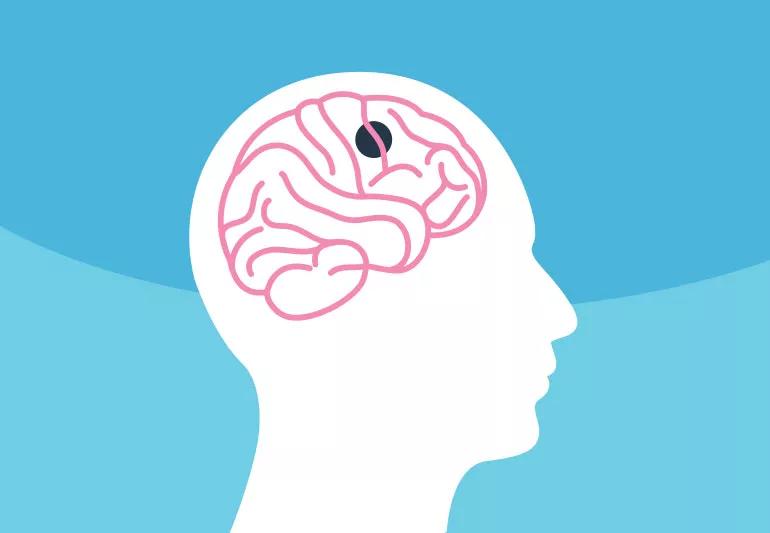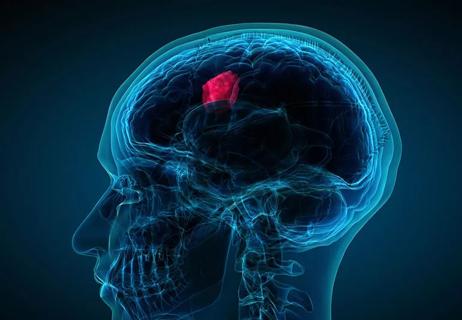The difference between benign and malignant brain tumors

If you’ve just found out you have a brain tumor, you might be surprised to learn it doesn’t necessarily mean you have cancer. (Yes, that’s right. Let us explain.)
Advertisement
Cleveland Clinic is a non-profit academic medical center. Advertising on our site helps support our mission. We do not endorse non-Cleveland Clinic products or services. Policy
There are many different types of brain tumors. Some are benign (not cancerous) and others are malignant (meaning cancerous).
“What your tumor looks like on an imaging study and your clinical history will usually give us a pretty good idea if your tumor is benign or malignant,” says neurosurgeon Pablo Recinos, MD. “If it’s unclear, we may need to do a short-term imaging follow-up or a biopsy.”
Benign brain tumors may still need treatment, though. They grow and press on nearby areas of the brain, but rarely spread into other tissues. There are cases where they can come back.
“Benign tumors can be troublesome, depending on their location,” says Dr. Recinos. “If they’re on the top of the head where there are no critical nerves, growth is more tolerated. Tumors that are close to critical nerves or pushing on the brain stem can cause symptoms, some of which are severe.”
The goal of treating benign brain tumors is to surgically remove as much of the tumor as is safely possible.
“If a benign tumor is stuck to an important nerve or artery and the only way to remove it is to put that nerve or artery at risk, the surgeon may only remove part of the tumor,” says Dr. Recinos.
After your tumor has been removed, you will need to undergo periodic imaging studies. Follow up is important because there still exists a chance that there could be some tumor cells that weren’t visible during the surgery and the tumor could recur.
Advertisement
If a portion of a residual tumor grows, your doctor may recommend traditional radiation therapy or radiosurgery. Chemotherapy does not usually play a significant role in treating benign brain tumors, but there are some exceptions.
“Some patients have expressed concerns that removing a benign brain tumor will stir it up and make it grow faster,” says Dr. Recinos. “That’s not going to happen because it doesn’t work that way.”
Malignant brain tumors are likely to grow quickly and spread into other brain tissue. The initial goal for treating malignant brain tumors is to remove as much of the tumor as possible while still preserving brain function.
“In some cases, it may be necessary to give up some function in order to obtain a complete resection,” he says.
For the majority of malignant tumors, chemotherapy has been used as an additional treatment method after resection. In addition, there are a few new treatments, such as immunotherapy, which are currently being evaluated in clinical trials.
There are multiple types of surgery that are used to remove brain tumors.
“Surgical options range from traditional open surgery to more minimally invasive approaches like endoscopic surgery or laser ablation,” says Dr. Recinos. “However, minimally invasive surgeries may not be options for everyone. In some cases, we’re able to do a staged approach where we use a combination of open and endoscopic surgeries.”
Advertisement
Learn more about our editorial process.
Advertisement

Rest assured: Most headaches are not caused by brain tumors

Eat fruits, vegetables, legumes, whole grains, lean proteins and healthy fats to help manage symptoms of this degenerative brain condition

When the familiar suddenly feels unfamiliar, it could be nothing — or something worth noting

Déjà vu is a fleeting, false memory — it can be harmless or a sign of something more

This child development strategy is all about meeting your child where they are

Current research suggests 1 of every 31 children in the U.S. has ASD — and that’s probably an undercount

Air pollution, pesticides and chemicals — along with genetic factors — can increase your risk of this brain condition

The ‘Six Pillars of Brain Health’ offers a game plan to maintain cognitive function

If you’re feeling short of breath, sleep can be tough — propping yourself up or sleeping on your side may help

If you fear the unknown or find yourself needing reassurance often, you may identify with this attachment style

If you’re looking to boost your gut health, it’s better to get fiber from whole foods